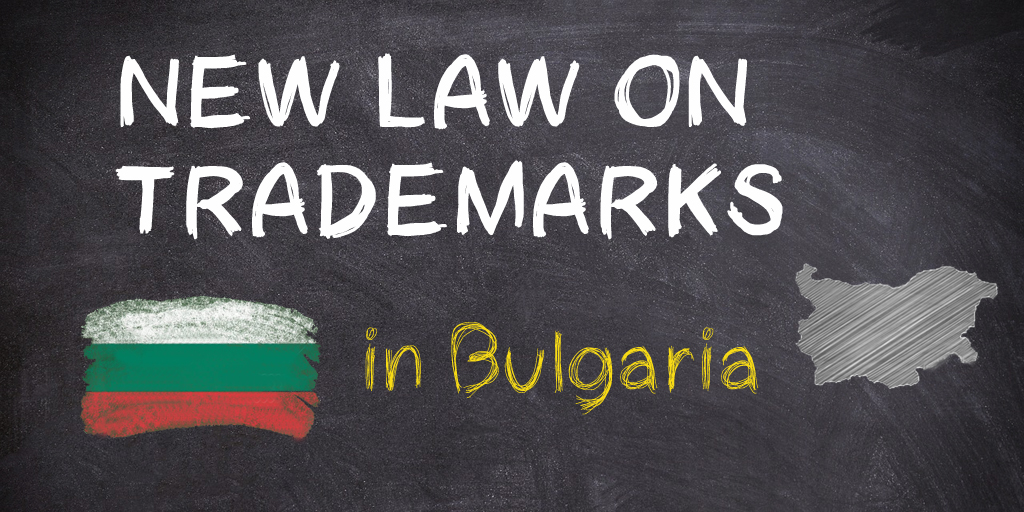A new Law on Marks and Geographical Indications (LMGI) entered into force on December 17, 2019 in Bulgaria. The new LMGI aims to transpose Directive (EU) 2015/2436 into the national legislation, as well as to bring the national legislation regarding geographical indications in line with the provisions of Regulation (EU) No. 1151/2012, Regulation (EC) No 110/2008, and Regulation (EU) No 251/2014.
The new law is applicable to all applications and invalidation proceedings for which no decision has entered info force as of December 17, 2019.
The main changes can be summarized as follows:
Definition
In accordance with Directive (EU) 2015/2436, the requirement for “graphical representation” has been abolished. Instead, the sign should be capable of being “represented in the State Register of Marks in a way that allows the subject of the protection provided by the registration to be clearly and accurately determined.”
Usage in the course of trade
The scope of the term “usage in the course of trade” is now broader and it also includes (i) using the sign as a trade or company name or part of a trade or company name; (ii) using the sign in comparative advertising in a manner that is contrary to the corresponding provisions of the Law on Protection of the Competition.
Absolute grounds for refusal
The prohibition to register a mark related to the shape of the goods has been extended also to “other characteristics”, which is a result of the removal of the requirement for graphical representation.
Further absolute grounds for refusal has been added referring to the local and EU legislation and international agreements regarding geographical indications, traditional speciality guaranteed, traditional names for wines and plant variety.
Relative grounds for refusal
Some new relative grounds for refusal (and consequently – grounds for filing an opposition) have been added, namely: (i) bad faith – however, the bad faith of the applicant should be established by a court decision; (ii) company name used in the course of trade, (iii) geographical indications.
With regard to trademarks with reputation, it has been explicitly specified that protection will cover not only dissimilar goods and services, but also goods and services identical and similar to the goods and services of the earlier mark. Furthermore, if is now clarified that if the earlier mark is an EUTM, the reputation should refer to the territory of the EU (and not Bulgaria).
With regard to trademark applications filed in the name of the agent or representative of the real owner, the new law provides that the registration will not be refused if the agent/representative can justify its actions. Furthermore, the real owner might as well request the application to be transferred to its name, instead of being refused, as a result of the opposition proceedings.
Oppositions
The following novelties have been introduced with regard to opposition procedures:
- the three-month term for filing oppositions against the Bulgarian designation of IRs will start running after two months following the date of publication of the IR in the local bulletin (and not after six months, as according to the old law)
- if an agreement between the parties has been reached during the cooling-off period, ½ of the opposition fee will be returned to the opponent, under its request
- requests for proof of use of the earlier mark will be admissible if the earlier mark has been registered for more than 5 years as of the date of filing/the priority date of the contested application (and not as of the date of filing of the opposition, as according to the old law)
- if the opposition is directed only against a part of the goods, the applicant can divide the application. The new (divided) application should contain the goods/services of the initial application, which have not been opposed.
No registration fees
The new LMGI abandons the two-stages payment of official fees. If no oppositions have been filed (or an opposition has been found ungrounded), the application will be registered and the registration will not be a subject to payment of registration fees. A single fee should be paid at the beginning.
With regard to the new system of payment of official fees, a new Tariff of Fees is expected to be published soon.
Appeals and invalidation procedures
The appeal and invalidation (cancellation and revocation) procedures have been prescribed in more details. In particular:
- it is specified that the date from which the five-year grace period for non-use for IRs is calculated is the date of publication of the IR in the local bulletin
- it is explicitly specified that the holder of the mark against which a cancellation request has been filed can request proof of use of the earlier mark, if the earlier mark has been registered for more than 5 years as of the date of filing of the request for cancellation. If as of the date of filing of the contested mark/the priority date more than 5 years have passed from the registration of the earlier mark, then the proof of use should also cover 5 years before that date.
Terms
In order to provide faster procedures, the new law provides shorter terms – both procedural terms for the parties in various proceedings and terms for the PO to issue decisions.
Confidential information
When parties present information to the PO in various proceedings, they could indicate and motivate that certain materials and documents contain trade secret and should be treated as confidential. In such cases, the PO will send a notification to the parties of the proceeding indicating the possibilities for obtaining a copy of the confidential materials. Decisions will be issued in two versions. The complete decisions will be kept in the files and the parties will be notified about the possibilities to be provided a copy. Short version of the decisions where the confidential information does not appear will be published online.
Enforcement and infringement
The new law explicitly provides that proof of use of the earlier mark can be requested within a lawsuit for trademark infringement, if the earlier mark has been registered for more that 5 years as of the date of filing of the lawsuit.
The administrative liability and fines have been increased.
Geographical indications
The new law provides that GI for agricultural products and foodstuffs that fall under the scope of protection of Regulation (EU) No 1151/2012, for spirit drinks that fall under the scope of protection Regulation (EC) No 110/2008, for products under Art. 92, par. 1 of Regulation (EU) No 1308/2013 and for aromatised wine products that fall under the scope of protection of Regulation (EU) No 251/2014, shall be refused. The registration of all existing GI for those products has been terminated.






